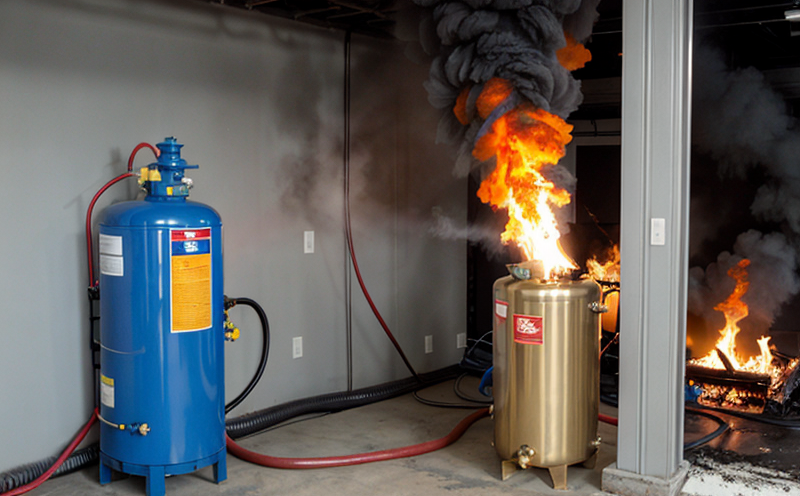Industrial Equipment Fire Suppression System Testing
The testing of fire suppression systems in industrial equipment is a critical process that ensures safety and compliance with international standards. Industrial environments, such as manufacturing plants, chemical facilities, and warehouses, are exposed to various ignition sources due to the nature of their operations. Ensuring these environments are equipped with reliable and effective fire suppression systems is paramount for safeguarding personnel and property.
The primary goal of industrial equipment fire suppression system testing is to evaluate the performance of installed fire protection systems under simulated real-world conditions. This process involves rigorous testing procedures that mimic potential fire scenarios, thereby identifying any weaknesses or deficiencies in the design or installation of these systems. The standards guiding this testing are stringent and internationally recognized.
During the testing phase, industrial equipment fire suppression systems undergo various performance assessments to ensure they meet the specified criteria for effective operation. This includes evaluating the response time, discharge characteristics, and overall functionality of the system components such as nozzles, pipes, and control valves. The test parameters are meticulously defined in accordance with international standards like ISO 17626 or ASTM E903.
Preparation for testing involves a thorough examination of the industrial equipment to identify any potential issues that could affect system performance during testing. This includes cleaning, disassembly where necessary, and ensuring all components are in optimal condition. The specimen preparation is crucial as it directly impacts the accuracy and reliability of the test results.
The instrumentation used for these tests is sophisticated and designed specifically to replicate real-world fire conditions. Equipment such as flame simulators, temperature sensors, pressure gauges, and flow meters are employed to monitor critical parameters during the testing process. The data collected from these instruments provides a comprehensive understanding of the system’s performance under various stress conditions.
The results of industrial equipment fire suppression system tests are meticulously documented in detailed reports that outline the findings and recommendations for improvement. These reports serve as valuable tools for quality managers, compliance officers, R&D engineers, and procurement professionals to make informed decisions regarding the maintenance and enhancement of fire protection systems within their facilities.
In addition to ensuring compliance with international standards, industrial equipment fire suppression system testing plays a pivotal role in enhancing overall safety protocols. By identifying areas of improvement through rigorous testing, organizations can implement preventive measures that reduce the risk of fires in high-risk environments. This proactive approach not only protects personnel but also minimizes potential damage to valuable assets and infrastructure.
The importance of industrial equipment fire suppression system testing cannot be overstated. In sectors like manufacturing, where continuous operations are critical, any disruption due to a fire can lead to significant financial losses and operational downtime. By adhering to the highest standards and employing comprehensive testing protocols, organizations can significantly reduce these risks.
Furthermore, regular testing of industrial equipment fire suppression systems helps in maintaining regulatory compliance and demonstrates a commitment to safety and quality. This is particularly important for industries operating under strict government regulations or those seeking certifications that require adherence to specific safety standards.
Why Choose This Test
Selecting the right fire suppression system testing service is essential for ensuring the safety and integrity of industrial equipment. Here are several reasons why choosing this test is beneficial:
Customer Impact and Satisfaction
The impact of thorough fire suppression system testing on customers is profound and multifaceted. For quality managers and compliance officers, the results of these tests provide critical insights into the performance of installed systems, allowing for informed decision-making regarding maintenance and upgrades.
For R&D engineers, testing offers a platform to innovate and refine existing fire protection technologies based on real-world data. This not only enhances product development but also positions organizations as leaders in safety and technology.
Procurement professionals benefit from the detailed reports generated during testing, which help in selecting high-quality suppliers and products that meet stringent performance criteria. This ensures that the equipment purchased is reliable and meets international standards.
The overall satisfaction of customers is significantly enhanced when they know their industrial environments are equipped with fire suppression systems that have been rigorously tested and proven effective. This leads to greater trust in the services provided, fostering long-term relationships and business growth.
International Acceptance and Recognition
The testing of industrial equipment fire suppression systems is widely accepted and recognized across various international standards. These standards not only ensure consistency but also provide a benchmark for performance that is universally acknowledged.
Organizations operating in multiple countries benefit from the global acceptance of these tests, as they can rely on consistent results regardless of location. This uniformity is crucial for maintaining regulatory compliance and achieving industry-specific certifications internationally.
The use of international standards like ISO 17626 or ASTM E903 ensures that testing procedures are rigorous and reliable, providing a level of trust that is essential in the global marketplace. These standards also facilitate easier collaboration with partners from different regions, as they share a common understanding of performance criteria.
In conclusion, adhering to international acceptance and recognition through thorough fire suppression system testing not only enhances safety but also supports business growth by ensuring compliance and fostering trust among customers and stakeholders worldwide.





